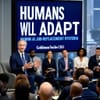David Solomon, the CEO of Goldman Sachs, has dismissed widespread fears that artificial intelligence (AI) will lead to mass unemployment, arguing instead that humans and economies will adapt as they always have. He emphasised that while AI will impact many job functions, the broader economy is resilient and “very nimble,” capable of absorbing change and re-skilling workers in new roles.
Solomon explained that while certain roles may shrink or transform, he foresees a net increase in “high-value people” within the organisation—those who work alongside AI tools, provide strategic insights, and complement rather than compete with machines. He argued that AI is more about augmenting human productivity than replacing humans outright, pointing to Goldman’s own investments in technology and shifts in staffing strategies as evidence.
He did, however, acknowledge that this transition may involve turbulence for some job functions. The speed of AI advancement might cause “a little bit more volatility, or an unsettled transition around certain job functions,” he said. But Solomon maintained that this is fundamentally similar to past waves of automation, just faster, and that the key is adaptation—through training, changing job mixes and rethinking how human labour and AI interact.
In summary, the message from Goldman Sachs’ leadership is cautiously optimistic: AI is not a job-apocalypse trigger but a catalyst for job evolution. Success will depend on how businesses, workers and societies respond—by focusing on roles where human judgement, creativity and social intelligence matter most, and by preparing for changes in labour dynamics rather than being blindsided by them.


